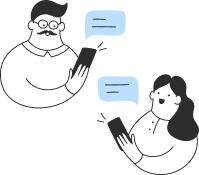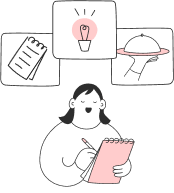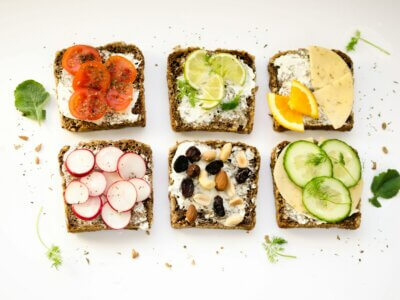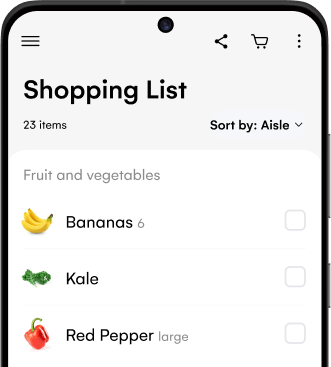Have you ever felt an intense desire to eat ice-cream or an almost overwhelming longing for a burger? To chow down on something crunchy or salty? Those intense urges to eat specific foods are called food cravings. And sometimes, food cravings mean more than just ‘i love donuts.’
Food cravings are thought to be a significant factor behind the amount of food people eat and the currently high levels of obesity. While men are thought to crave savory meals like burgers and women to crave sweet foods like chocolates, this is not always true.
Plan meals together! Share this plan with your family

Food cravings can be driven by many factors, and sometimes they can provide insights about what’s happening in your body. When you have a strong, specific craving, it could be a sign that your body has too little of certain nutrients, that you need more sleep, or even signal changes in your hormones.
Here’s more about food cravings, what causes them and what they could mean.

Possible Causes of Food Cravings
It’s not always possible to identify the causes of food cravings. Sometimes you have cravings due to external triggers (think how you feel when you pass a billboard for a juicy, cheese-topped burger) or internal triggers like connecting a certain food to a fond memory. Emotional eating can be a real cause of overeating, as well as food cravings.
What if it’s more than that?
Of course, not all cravings mean something. Sometimes you’re just in the mood for a bar of chocolate, and that’s completely normal.
But if you’re regularly experiencing strong, specific cravings, you might start by looking at these factors.
1. Too little sleep
Research suggests that people who don’t get enough sleep are more likely to experience food cravings. If you aren’t sleeping for about 7–8 hours every day, that could disrupt the balance of your body’s hunger hormones and cause intense food cravings.
Lack of sleep typically causes non-selective food cravings. The best way to handle them is to focus on getting more shut-eye.
2. Nutrient deficiency
If your body is low on any nutrients, you may experience a strong urge to eat foods that contain them. One example of this is pica. Pica is a condition where people crave non-nutritive items like ice, sand, or cornstarch. Pica is more common among children and pregnant women.
Research suggests that people who experience Pica often have low levels of iron, calcium, or zinc. When those nutrients are ‘topped up’ through supplements, the cravings usually stop.
Another instance is when people lack sodium and crave salty foods. Salt is made of sodium and chloride. When people don’t have enough salt, it can trigger cravings for salty food. This may happen when taking medication such as diuretics that lead to loss of salt in urine.
However, being low on sodium is rare in most cases. And a high sodium diet is associated with health risks such as high blood pressure, heart disease, and stroke.
If you crave salty foods, it could also be due to a habit of eating salty food.
The daily recommended amount for salt is 2300 grams (about a teaspoon) and two-thirds of that if you have high blood pressure or are older than 50 years. Consider eating foods rich in herbs or spices to tame your salt carvings and weaning yourself off salt gradually if you’re eating a high sodium diet.
3. Low blood sugar
When your blood sugar levels are low, it triggers hormones responsible for hunger and appetite. This can happen when you go for long periods of time without eating or without eating enough.
The solution? Eat small, regular meals. Plan for a nutritious snack if you can’t have a meal.

4. Hormones
Hormones regulate your body functions including the way you respond to food, hunger, appetite, and cravings.
An imbalance in the hormones that regulate hunger and fullness, called ghrelin and leptin, can make you experience more food cravings. Also, the luteal phase of your menstrual cycle can make you more likely to crave food.
Create your own recipes from scratch

5. Poor hydration
When you don’t drink enough water, it could make you feel hungry or even crave certain foods.
Experts say men should drink about 3000 ml water each day and women about 2200 ml to stay hydrated. Apart from keeping cravings at bay, drinking enough water can also help your kidneys stay healthy, improve your digestion and help flush any toxins from your body.
6. Medication
Medication can alter the way your body functions. Some medications can interfere with hormones that regulate hunger, while others can make you lose micronutrients. Some can even prevent you from feeling full.
Increased appetite is also a side effect of many drugs including certain medications for conditions like epilepsy, diabetes, psychosis, depression, blood pressure. Steroid hormones, vitamin B supplements and cannabis-based drugs can also affect your appetite.

7. Gut bacteria
There’s evidence that suggests gut bacteria influence the kind of foods you crave and how often you crave them. Gut bacteria may be able to increase your cravings for foods that benefit them and suppress other types of bacteria.
What do you do about food cravings?
Food cravings can trigger overeating and lead to excess weight gain. Sometimes, these cravings are a sign that there are changes in your body such as hormone imbalance, low blood sugar, dehydration, and nutrients deficiency. Other times, they could be due to habits, poor sleep or even stress.
We have some advice on how to beat these feelings as well as how to figure out what triggers them. And there’s no doubt that if you get enough sleep, eat a balanced diet, manage your emotions and drink enough water, you can alleviate a lot of cravings.
But if you suspect your cravings are more than just a passing desire for a packet of chips, it could be that you’re deficient in a vitamin or mineral, are struggling with hormonal changes, or something else. If you have concerns, it’s best to make an appointment with your doctor.



